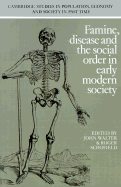Book contents
- Frontmatter
- Contents
- List of contributors
- List of figures
- List of tables
- Andrew Appleby: A personal appreciation
- A bibliography of Andrew B. Appleby's principal works in chronological order
- List of abbreviations
- 1 Famine, disease and crisis mortality in early modern society
- 2 The social economy of dearth in early modern England
- 3 Death in Whickham
- 4 The response to plague in early modern England: public policies and their consequences
- 5 Demographic crises and subsistence crises in France, 1650-1725
- 6 Markets and mortality in France, 1600–1789
- 7 Some reflections on corn yields and prices in pre-industrial economies
- 8 Family structure, demographic behaviour, and economic growth
- Consolidated bibliography
- Index
- Cambridge Studies in Population, Economy and Society in Past Time
8 - Family structure, demographic behaviour, and economic growth
Published online by Cambridge University Press: 01 June 2011
- Frontmatter
- Contents
- List of contributors
- List of figures
- List of tables
- Andrew Appleby: A personal appreciation
- A bibliography of Andrew B. Appleby's principal works in chronological order
- List of abbreviations
- 1 Famine, disease and crisis mortality in early modern society
- 2 The social economy of dearth in early modern England
- 3 Death in Whickham
- 4 The response to plague in early modern England: public policies and their consequences
- 5 Demographic crises and subsistence crises in France, 1650-1725
- 6 Markets and mortality in France, 1600–1789
- 7 Some reflections on corn yields and prices in pre-industrial economies
- 8 Family structure, demographic behaviour, and economic growth
- Consolidated bibliography
- Index
- Cambridge Studies in Population, Economy and Society in Past Time
Summary
Historical demography, together with its parent discipline, has been through a long phase of technical abstraction. While this has produced some notable advances both in method and in our understanding of population processes, I believe that the crucial question is still that with which the discipline began, namely to understand the parameters that determine the success or failure of populations to keep in balance with the economic space they inhabit. The process is a complex one, for population change is not only embedded in an economic context, but also itself modifies that context. The outcome of the mutual interaction between population and economy is obviously relevant to many of the issues considered in this volume: societies that outrun their economic space are more likely to experience dearth and famine than are those that can contrive to keep population and economy in balance. Moreover, since Malthus, it has been recognised that the nature of the mutual accommodation that is in practice reached between the processes of demographic and economic change in a specific society is influenced not only by the economic and political power-structures governing the ownership of wealth and the allocation of rewards to labour, but also by value systems affecting inter-personal relations within the family and the wider collectivity.
- Type
- Chapter
- Information
- Famine, Disease and the Social Order in Early Modern Society , pp. 279 - 304Publisher: Cambridge University PressPrint publication year: 1989
- 16
- Cited by



